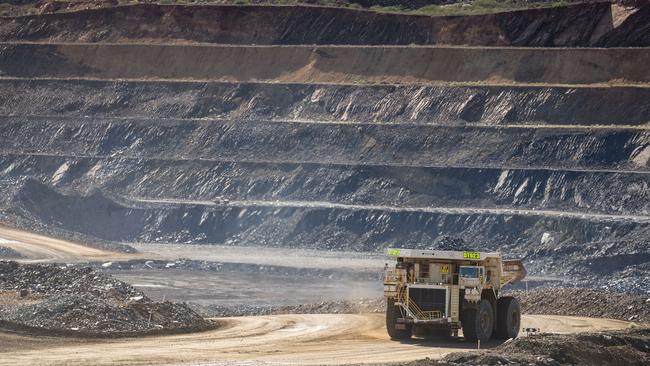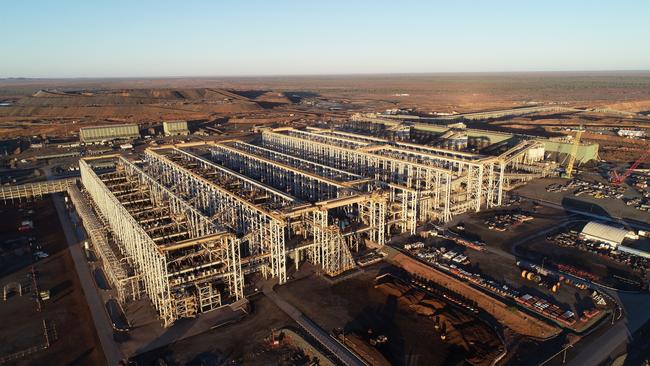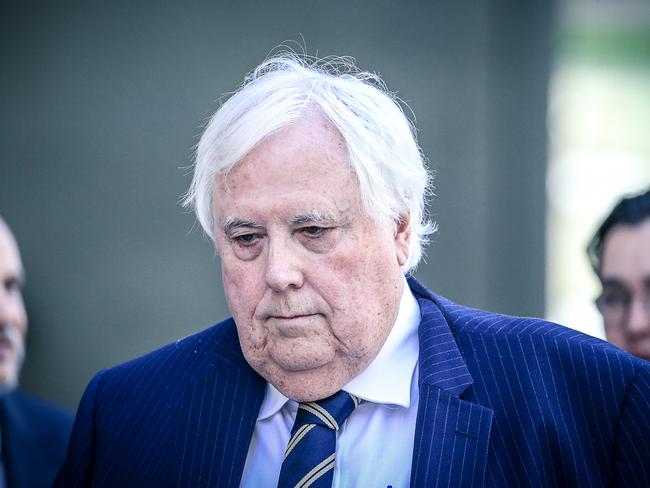Mining job losses loom as Clive Palmer dispute boils over
The standoff between Clive Palmer and CITIC is reaching boiling point, with the Chinese company saying it will be forced to curtail output from its Pilbara iron ore operations.

More jobs in WA’s resources sector are under threat as the long-running dispute between China’s CITIC and Clive Palmer boils over into production cuts at the massive Sino Iron magnetite project in the Pilbara.
CITIC told the Hong Kong stock exchange overnight it would be forced to slash output from Sino Iron by about a third over a running dispute with Mr Palmer’s Mineralogy over the extension of tailings storage facilities at the giant project.
CITIC exports about 21 million tonnes a year of high grade magnetite concentrate from the Pilbara, but said on Wednesday night that will be cut to 14 million tonnes in 2024 amid the ongoing disputes.
The massive conglomerate, owned 58 per cent by the Chinese government, operates the $16bn mine, but Mr Palmer’s Mineralogy is the landlord, and still owns the underlying State Agreements that ultimately govern its operations.
It is Mr Palmer’s companies that must submit environmental and other approval documents allowing the extension of CITIC’s operations, or major changes to previously approved plans.
But the two companies have been locked in a sprawling legal battle for the better part of the last decade over royalty payments, their impact on other parts of Mr Palmer’s business empire, and contributions to rehabilitation funds for the CITIC operations.
As part of those disputes, Mineralogy has refused to submit applications for an extension of the tailings facilities and waste dumps at Sino Iron.
A year ago, CITIC lost an attempt in the WA Supreme Court to force Mineralogy to submit the plans to the state government, partly because the plans submitted by CITIC included ground outside of its original agreement with Mineralogy.

Mineralogy had demanded $US750m from CITIC to allow the inclusion of the additional ground and, in his decision on the matter, Justice Kenneth Martin found that the amount cited “does not present to this commercial Court as being outlandishly out of place in a robust negotiation between commercial heavyweight”.
Both Mr Palmer and CITIC filed appeals against that decision, but the matter is not due to return to court until later this year.
Mr Palmer told The Australian on Thursday the decision to curtail production was one for CITIC to make. He said the dispute could be solved easily.
“The Supreme Court has already told them that,” he said.
“It’s not unusual for Australians to require payment for their assets. Just because an overseas government decides they can confiscate things from people, they are not allowed to do it. All CITIC needs to do is look at that dispute, respect the judgement of the court, and deal with it in the same way normal Australian companies do.”
CITIC has been warning for years its operations would eventually be curtailed if Mineralogy did not submit the applications, and said on Wednesday night that was the reason for its decision to slash output from the mine.
Mr Palmer said CITIC had been making the same threat for years, describing the threat as “blackmail” designed to get Australian politicians to intervene on CITIC’s behalf.
“The politicians will all be frightened and running around like chooks. But that’s just the way the government operates,” he said.

CITIC says it has now resubmitted its plans to include only land included in its original agreement with Mineralogy, but Mr Palmer’s company has still refused to submit the documents to the state government.
The company says it has launched fresh legal action aimed at forcing Mineralogy to submit the plans for approval.
CITIC’s local chief executive, Chen Zeng said an “urgent” resolution to the running dispute was needed.
The mining and processing operation has massive fixed costs, and is likely to struggle to be profitable if not run at full capacity, and Mr Chen warned a full suspension of the mine was possible if the issue was not resolved.
CITIC did not say whether the decision would lead to immediate job losses, and the company is understood to be reviewing its options around its workforce as it reworks mining and processing plants.
“In the short-term, we will do everything possible to protect and retain our workforce. However, there will be adverse impacts on some contracting activities, project expenditure, revenue, royalty payments and short to medium term project viability,” Mr Chen said.
“Urgent resolution of these time-critical issues remains necessary to avoid further production
reductions and project suspension. This should be the focus of all stakeholders. Having achieved so much at Sino Iron in recent years, suspension would be a devastating outcome on many levels.”
Sino Iron employs about 3000 workers, directly and indirectly.


To join the conversation, please log in. Don't have an account? Register
Join the conversation, you are commenting as Logout